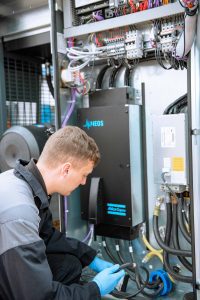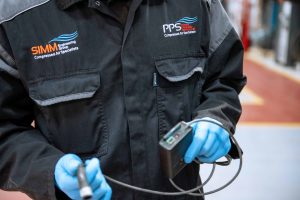 This article shares a look into air compressor CFM and PSI – to help you understand what size compressor you need.
This article shares a look into air compressor CFM and PSI – to help you understand what size compressor you need.
You’re looking for a new compressor and you know compressed air can be a major contributor to your energy bills, but how do you know what size compressor is right for your application?
For this, it helps to understand PSI and CFM, and how they are used to specify the performance of an air compressor through measurements of pressure and flow.
As with any industrial purchase, it’s best to seek out expert advice from a qualified compressed air engineer, but here’s our handy guide to give you an overview.
CFM is a shortening of cubic feet per minute. This stands for the volume of air that an air compressor can supply per minute – in other words, its flow or output.
PSI represents pounds of force per square inch. Like CFM, this is a measurement of air compressor output, but in this case, it measures air pressure rather than air flow.
Known as the fourth utility, compressed air can be a major contributor to your monthly energy bills, accounting for as much as 30% of your electrical power consumption. This is why you need to think carefully and get advice when you’re making a new purchase or signing a new hire agreement.
Over-specification can mean spending more on capital equipment than you need to, so beware of the sales person who tries to push you into purchasing a bigger, more powerful machine than your application requires.
At the same time, going for a cheap air compressor can lead to under-specification, with the result that it doesn’t meet your needs and you have to replace it a short time later.
As well as cost benefits, purchasing the right air compressor will reduce downtime, increase productivity, lower your energy bills and reduce lifecycle costs.
The amount of CFM or flow required depends on the ability of the air compressor to perform a task within a particular amount of time.
A compressor is under-specified if it’s not providing enough flow and you have to wait for pressure to build up in the reserve tank. Some applications require a constant flow of air, others require the compressor to provide air only part of the time.
It can also depend on the type of compressor you are using. As a general rule, rotary screw air compressors will put out more flow per kW than piston compressors will.
If you have a simple piece of equipment, the manufacturer should be able to provide data sheets that set out the amount of flow needed to operate it. However, this may not work with a more complex system.
For peace of mind your best option is to ask a compressed air sales engineer to carry out an energy audit (see below).
 How do I know what PSI I need?
How do I know what PSI I need?In short, you’ll need enough pressure to provide sufficient force for your application. If your compressor cannot produce the PSI at a high enough level, it won’t be able to carry out the required task.
The PSI you will need will once again depend on your application and whether you need a constant supply of air. Large air compressors used in manufacturing will naturally operate at a higher PSI than a small compressor for household use.
As with CFM, your best bet is to request a full energy audit of your system so that the air compressor engineer can provide a bespoke solution.
The temptation when replacing an old air compressor is to look at the kilowatt (kW) rating and buy “like for like”. A better approach would be to work out the PSI and CFM – the pressure and flow – required for your application, and select your model accordingly.
Choosing a machine with a high CFM doesn’t automatically mean you are buying a better air compressor. The higher the CFM, the more powerful the compressor – but you may be paying for power you don’t need. For example, a compressor with a small CFM will be sufficient to power air tools, but to operate the pneumatics in a manufacturing unit you will need a compressor that can pump out a significantly higher air flow.
Another variable is whether you are running or planning to buy a variable speed compressor, such as those in the Atlas Copco VSD and VSD+ range. These can offer significant energy and cost savings compared with traditional fixed speed compressors.
As mentioned earlier, an energy audit will help you to establish what size of compressor you need and the levels of CFM and PSI.
Energy audits are usually carried out as a free service and consist of data logging your existing compressor and equipment. This gives accurate feedback on your compressed air demand, pressure and cycle over a set period, identifying energy costs and where savings can be made. Data like this is crucial to help answer the question of what size compressor you need.
 What else should I take into account when buying a new air compressor?
What else should I take into account when buying a new air compressor?Because the latest air compressors on the market make use of state-of-the-art technology and operate more efficiently, you may find that you need a machine with a lower kW output than your older model.
Also, there are many elements to a compressed air system, such as dryers, filters and pipework, along with pneumatics. Some of these may need upgrading to get the best results from your new air compressor.
Finally, don’t forget to factor in any projected increase in use to future proof your purchase, for example if you are planning to open a new manufacturing line or increase your production schedule to 24/7.

